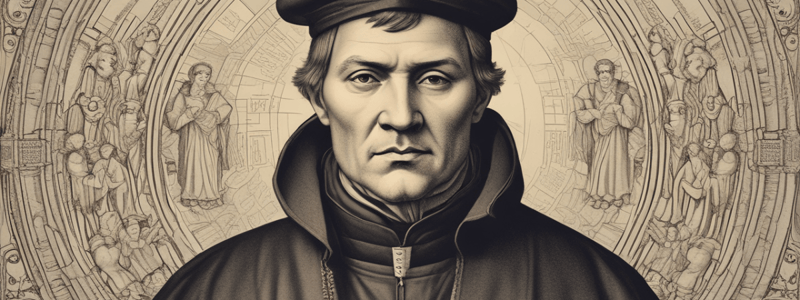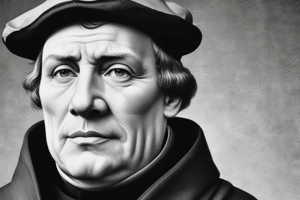Podcast
Questions and Answers
Luther's 95 Theses was the primary cause of the Protestant Reformation.
Luther's 95 Theses was the primary cause of the Protestant Reformation.
False (B)
Luther believed the issue with the medieval church was primarily one of theological method.
Luther believed the issue with the medieval church was primarily one of theological method.
True (A)
Luther's theology did not emphasize the significance of Christ's crucifixion.
Luther's theology did not emphasize the significance of Christ's crucifixion.
False (B)
The Heidelberg Disputation in 1518 marked a significant turning point in Luther's theology.
The Heidelberg Disputation in 1518 marked a significant turning point in Luther's theology.
Luther's later theology was not an elaboration of his earlier insights.
Luther's later theology was not an elaboration of his earlier insights.
Scholasticism referred to a theological method that emphasized reason and individual experience.
Scholasticism referred to a theological method that emphasized reason and individual experience.
The Incarnation played a central role in Luther's theology.
The Incarnation played a central role in Luther's theology.
Luther's critique of scholasticism was not influential in shaping the Protestant Reformation.
Luther's critique of scholasticism was not influential in shaping the Protestant Reformation.
Thomas Aquinas' lectures on physics and logic are allowed to continue in the university curriculum.
Thomas Aquinas' lectures on physics and logic are allowed to continue in the university curriculum.
The introduction of Greek and Hebrew into the university curriculum is driven by aesthetic reasons.
The introduction of Greek and Hebrew into the university curriculum is driven by aesthetic reasons.
Philip Melanchthon is appointed as the chair of Hebrew at the University of Wittenberg.
Philip Melanchthon is appointed as the chair of Hebrew at the University of Wittenberg.
The removal of original languages from curricula has no theological implications.
The removal of original languages from curricula has no theological implications.
The University of Wittenberg fills two new chairs, one in Latin and one in Greek.
The University of Wittenberg fills two new chairs, one in Latin and one in Greek.
The late medieval traditions, including Scotism and Voluntarism, are discontinued at the university.
The late medieval traditions, including Scotism and Voluntarism, are discontinued at the university.
The study of the original languages is a key aspect of Luther's theological direction.
The study of the original languages is a key aspect of Luther's theological direction.
Greek is regarded as a beautiful language and is studied for its aesthetic value.
Greek is regarded as a beautiful language and is studied for its aesthetic value.
Luther lectured on Galatians in 1516 and 1517, and then revised those lectures.
Luther lectured on Galatians in 1516 and 1517, and then revised those lectures.
Luther's commentary on Galatians is focused on the significance of Christ's crucifixion.
Luther's commentary on Galatians is focused on the significance of Christ's crucifixion.
Melanchthon was Luther's senior colleague when he first arrived.
Melanchthon was Luther's senior colleague when he first arrived.
Luther's lectures on the Psalms were only given in 1513 and 1514.
Luther's lectures on the Psalms were only given in 1513 and 1514.
Luther's revision of his commentary on Galatians was influenced by his thinking on the dramatic opposites of glory and cross.
Luther's revision of his commentary on Galatians was influenced by his thinking on the dramatic opposites of glory and cross.
The Protestant Reformation had no impact on the development of Luther's theology.
The Protestant Reformation had no impact on the development of Luther's theology.
Luther's friendship with Melanchthon had no effect on his behavior or thinking.
Luther's friendship with Melanchthon had no effect on his behavior or thinking.
Luther's lectures on the Psalms were not influential in the development of his theology.
Luther's lectures on the Psalms were not influential in the development of his theology.
For Luther, the choice between dealing with God revealed in the flesh or God as he rides on the wings of the storm is a genuine choice.
For Luther, the choice between dealing with God revealed in the flesh or God as he rides on the wings of the storm is a genuine choice.
Calvin's theology was more influenced by his personal experiences than Luther's.
Calvin's theology was more influenced by his personal experiences than Luther's.
Luther believed that the flesh has no significance in understanding God's gracious nature.
Luther believed that the flesh has no significance in understanding God's gracious nature.
Luther's theology emphasized the significance of Christ's crucifixion.
Luther's theology emphasized the significance of Christ's crucifixion.
The Incarnation played a minor role in Luther's theology.
The Incarnation played a minor role in Luther's theology.
Luther's theology was not influenced by his personal history.
Luther's theology was not influenced by his personal history.
Calvin's conversion was a gradual process.
Calvin's conversion was a gradual process.
The Protestant Reformation had no impact on the development of Luther's theology.
The Protestant Reformation had no impact on the development of Luther's theology.
Luther's critique of scholasticism was primarily focused on the metaphysics of the scholastics.
Luther's critique of scholasticism was primarily focused on the metaphysics of the scholastics.
The significance of Christ's crucifixion is downplayed in Luther's theology.
The significance of Christ's crucifixion is downplayed in Luther's theology.
The Incarnation is a minor aspect of Luther's theology.
The Incarnation is a minor aspect of Luther's theology.
Luther's later theology was a significant departure from his earlier insights.
Luther's later theology was a significant departure from his earlier insights.
Luther's emphasis on the cross is a response to the question of how to justify oneself before God.
Luther's emphasis on the cross is a response to the question of how to justify oneself before God.
Luther's view of God is characterized by a focus on God's transcendence.
Luther's view of God is characterized by a focus on God's transcendence.
The Protestant Reformation had a significant impact on the development of theology.
The Protestant Reformation had a significant impact on the development of theology.
Luther's theology is characterized by a focus on the personal question of where to find a gracious God.
Luther's theology is characterized by a focus on the personal question of where to find a gracious God.
Flashcards are hidden until you start studying
Study Notes
Luther's Theological Trajectory
- Luther's 95 Theses were a spark that triggered an explosion, but his theology developed more significantly in the Disputation Against Scholastic Theology (September 1517) and the Heidelberg Disputation (April 1518).
- Luther's theology was focused on rethinking the church's theological method, which he believed needed to be based on the reality of the Incarnation, specifically Christ crucified.
Scholasticism
- Scholasticism refers to a method, not a metaphysic, and it is characterized as the theology of the schools.
- Luther's issues with scholasticism were related to the method of theology, particularly the criteria for theological language, and whether it was based on the way the world is or how God has revealed himself to be.
Luther's Relationship with Melanchthon
- Luther had a significant impact on Melanchthon, who was 21 years old and had an international scholarly reputation.
- Melanchthon was influenced by Luther's larger-than-life personality and was shaped by his friendship with Luther.
Luther's Theological Work
- Luther revised his lectures on Galatians (1516-1517) to sharpen his understanding of the law and the gospel.
- Luther engaged in a new series of lectures on the Psalms (1518), which provided valuable insights for scholars comparing his earlier and later understanding of the Psalms.
Theological Education and Languages
- Luther and his colleagues introduced Greek and Hebrew into the curriculum at the University of Wittenberg, driven by theological needs to access the Old Testament.
- The removal of original languages from curricula may have financial motivations, but it has theological implications.
Luther's Understanding of the Lord's Supper
- Luther's understanding of the Lord's Supper was connected to his personal history and the importance of the humanity of Christ.
- Luther believed that the flesh of Christ had to be present in the Lord's Supper, as it was only in the flesh that God had made himself gracious and merciful.
Theologian of Glory and Theologian of the Cross
- Luther's distinction between the theologian of glory and the theologian of the cross was based on the criteria for theological language and the understanding of God's revelation.
- The theologian of glory seeks to justify themselves by their good works before God, while the theologian of the cross recognizes God's revelation in the incarnation of Christ crucified.
- Luther's theology was profoundly shaped by his personal experience and the question of where to find a gracious God.
Studying That Suits You
Use AI to generate personalized quizzes and flashcards to suit your learning preferences.




